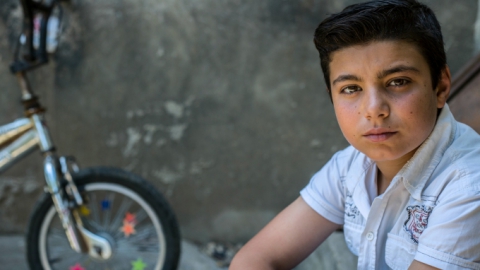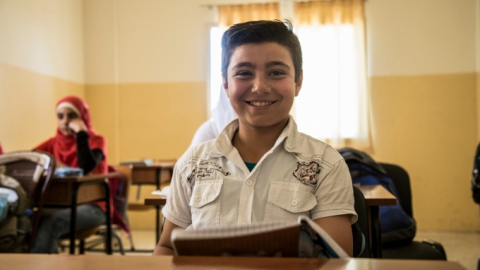Tarek's heavy bag

His black duffle bag is full to the brim. He drags it along the floor and straps the drawstring on his shoulder with two consecutive moves. Today’s journey has begun.
Tarek, 12, is leaving his house to embark on a tour around one of the villages in Mount Lebanon. Inside his bag, there are clothes, linen and socks. For the next five hours, he will try to market as much as he can. He is a child on a mission.
‘’I started working when I was ten,’’ says Tarek, wearing a white shirt and blue jeans.
‘’I have been selling clothes for one-and-a-half years. I work for four or five hours a day, but stay longer on weekends when there is no school. I fill my bag with pyjamas and underwear and wander around the town, repeatedly shouting ‘commodities! Commodities! Commodities!.’’’
Tarek’s childhood has been a tough roller-coaster ride. His family fled Syria’s northwestern city of Idlib after their house came under shelling in 2013. They decided to leave to Lebanon when the war escalated.
‘’Our village came under heavy shelling’’ Tarek’s mother recalls, her eyes fixed on her two little kids beside her.
‘’So, we all fled to a neighbouring town. We had been at my sister’s for only three days before a shell landed just outside the house. We escaped the mayhem with the clothes we had on.’’

The responsibility on Tarek’s young shoulders is heavier than his bag. Seeing that his father could no more afford the expensive life in the refuge, he decided he wanted to support him.
‘’My father never asked me to go to work, but I have to,’’ stresses Tarek, his words suggesting he is older than 12 years.
‘’I need to help him in these circumstances.
‘’I bring the money home and give them to my mother. Sometimes I make $20, but on other occasions, I don’t sell anything. We buy food and clothes with the money.’’
Making money isn’t all that Tarek worries about every time he sets off for a new tour. Selling clothes, for him, has more than one good side to it.
‘’I don’t know how heavy my bag is, maybe 15-20 kg. So, the more I sell, the happier I am, because this means the bag is less heavy.
‘’Three days ago, I woke up and felt exhausted, I didn’t go to work. My back and legs were hurting because of the walk and the weight.’’
Back pain is a ceaseless struggle that Tarek tries to put up with. Being out on the street brings with it other risks that a child in his age might not be aware of.
‘’One time, I was sitting down with my cousin,’’ Tarek recalls with furrowed forehead.
‘’We were joking together when a big man approached me. He grabbed me around the throat and asked why I was laughing. He almost suffocated me’’
Excitement for the second half of the day carries Tarek through the cold, lonely mornings. It is the time when he finally swaps his gigantic work bag for a schoolbag full of books.
Having missed out on learning in a public school- where he was rejected due to lack of space and language reasons- Tarek couldn’t continue his primary education in Lebanon.
Save the Children’s education programme, implemented in Beirut and Mount Lebanon, has provided Tarek with a glimmer of hope. He enrolled in one of the afternoon classes along with many of his peers who, like himself, didn’t get the chance to enrol in public schools.
The aim of the programme is to prepare vulnerable school-age children for formal education, through introducing several subjects to help them attain basic literacy and numeracy.

‘’I love to learn maths and play football,’’ says Tarek enthusiastically.
‘’We also study Arabic and English, but maths is my favourite subject because they teach us how to add up and calculate, and that helps in my work.’’
Assuming great responsibility at a very young age has left Tarek with no chance to think about his childhood dreams. The future is both unpredictable and unclear.
‘’I don’t know what my dream is, I never thought of it,’’
‘’But I miss my friends in Syria, we used to play together. I want Syria to be safe again.’’
Tarek might be unsure about his future, but he is in no doubt when it comes to which bag he would rather carry.
‘’School is better than work, because preparing a schoolbag is easier than preparing one for work,’’ he concludes.
‘’I prefer to carry my schoolbag because it doesn’t hurt my shoulder.’’
 Lebanon
Lebanon